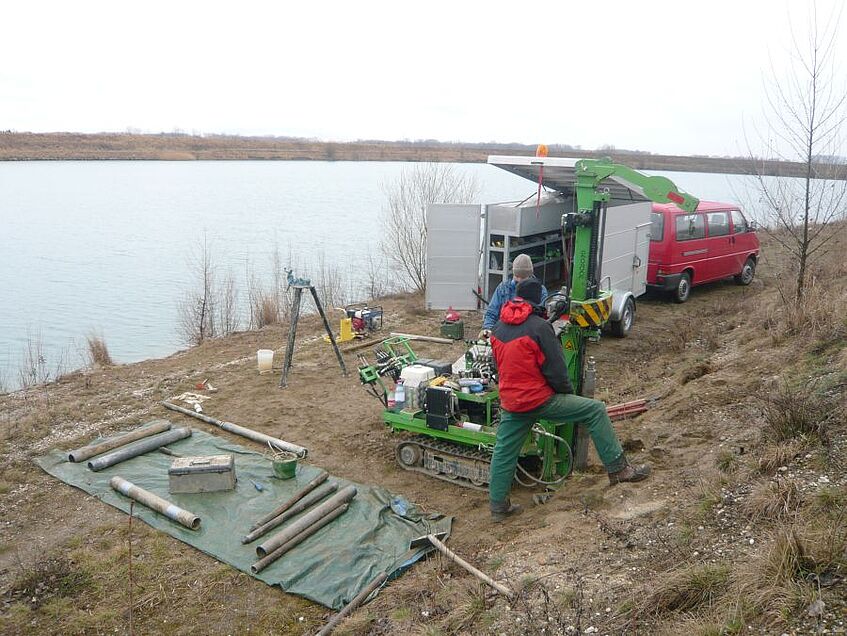Environmental Systems: Processes – Pollution – Solutions (Master)
Why study ... Environmental Sciences?
The master’s programme in Environmental Systems: Processes – Pollution – Solutions and the Environmental Sciences Research Network are a hub for students and scientists who want to apply deep scientific thought to the earth’s environment and some of its most urgent problems. Geoscientists, life scientists, geographers, chemists, physicists, mathematicians, economists and lawyers come together to tackle these problems in a collaborative way. Our goal is to prepare a new generation of professionals and scientists for solving the challenges ahead.
The interdisciplinary programme focuses on the analysis of fundamental environmental processes using knowledge from a wide range of scientific fields. This disciplinary diversity is not only reflected in the numerous fields of expertise of the Faculty, but also in the variety of students, who have a background in many different academic disciplines.
The master's programme deals with the scientific principles underlying the relationship between humans and the environment, focusing on system analysis. For this purpose, students acquire extensive skills in the relevant fields of natural sciences, in particular earth sciences and biology. The curriculum is internationally oriented and courses are held in English.
Master of Science
Degree Programme Code: 066 299
4 semesters / 120 ECTS credits
Language: English
Facts & Figures
- Students: n.a.
- Graduates in the last academic year: n.a.
- Number of semesters needed for graduation (median): n.a.
Data updated on: 03.12.2024
Admission Procedure
Information about the selection procedure
Information on Previous Studies:
In any case eligible degree programmes at the University of Vienna:
- Biology (Bachelor)
- Chemistry (Bachelor)
- Earth Science (Bachelor)
- Geography (Bachelor) - when the specialisation Physical Geography has been completed
- Meteorology (Bachelor)
- Physics (Bachelor)
Study Programme
Environmental Systems: Processes – Pollution – Solutions is an interdisciplinary programme that deals with processes that control the earth system and the impact of human activities on this system. The programme emphasises a rigorous process level understanding of important problems in environmental science to learn how to analyse the complex earth system. Therefore, scientific methods of earth sciences, physical geography, life sciences, chemistry, physics and mathematics are used.
The workload of the master’s programme comprises 120 ECTS credits, which is equivalent to a period of four semesters, and consists of the following (groups of) modules:
- Introduction to Environmental Science (15 ECTS)
- Introduction to Environmental Chemistry (15 ECTS)
- Environmental System Laboratories (30 ECTS)
- Individual Research Projects (10 ECTS)
- Individual Specialisation (20 ECTS)
- Master’s thesis (25 ECTS) and public defence (5 ECTS)
Five Concepts
which you will deal with during your studies (examples):
- Geochemistry
- Element cycles
- Atmospheric systems
- Water systems
- Terrestrial systems
and many more...

Student's Opinion

Student's Opinion
“Environmental Sciences is a multifaceted course programme with an interdisciplinary approach. It provides a great foundation in many different aspects of environmental sciences integrating the latest scientific standards in geochemistry, biochemistry, ecology, hydrology, biology, environmental risk assessment and many more.
I believe that this course is giving me the right tools to understand the science behind nature so I can explore new ways of solving the most pressing environmental issues of today such as destruction, degradation, exploitation and pollution.
The teachers are inspiring and share their fields of expertise with students, and are thus able to guide you on your chosen path.
This course allows me to build on my background experience working in the field of environmental protection with whaleofatime.org.”
- Irene Schleining, BSc
Overview of the programme structure & topics
Here you find the current offer of courses for this programme to gain better insight into the topics and structure. For more information please click on the respective level.
After Graduation
The faculty and students focusing on environmental sciences enjoy a global visibility and reputation. For example, the QS-World University Ranking by Subject has ranked the Environmental Systems programme among the best 100 programmes worldwide.
Vienna aims at educating future decision-makers in the fields of science, economy, public administration and in international organisations. Thanks to their system- and process-oriented, academically sound education, graduates have a wide range of job opportunities in:
- public administration, authorities and federal offices (environmental departments of provincial governments, the Environment Agency Austria, the Austrian Agency for Health and Food Safety, international public institutions)
- international organisations (e.g. FAO, UNEP, IAEA, NGOs, etc.)
- private planning and engineering offices as well as consulting activities (for example regarding environmental impact assessments, planning and surveying, or in the area of environmental due diligence)
- large-scale enterprises and infrastructure providers (environmental protection officers, project planning)
- science and research (a variety of research institutions that deal with environmental issues, universities, the corporate sector)

Graduates' Perspective on the Degree Programme
Graduates ...
- say that this degree programme receives the grade: 2.8 (satisfactory)
- rate the level of difficulty as: 3.4 (appropriate)
→ These results are based on feedback from 11 graduates.
*You can find further assessments of the degree programme from its graduates’ perspective in the graduate survey of the master's programme in Environmental Sciences (in German).
Graduates ...
- find employment within 3 months after graduation on average.
- earn an average of € 3,042 (women) and € 3,274 (men) gross per month within three years after graduation.
- work full time at a percentage of 81% (women) and 78% (men) within three years after graduation.
*You can find further information on career entry and career paths in the tracking of graduates "Natural Sciences, Mathematics and Statistics".

